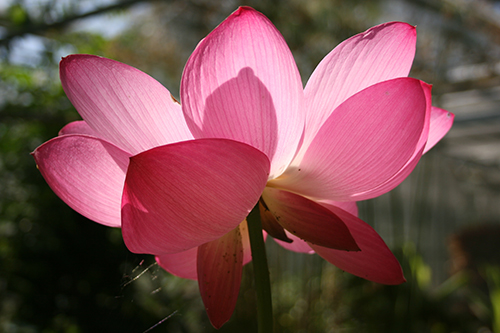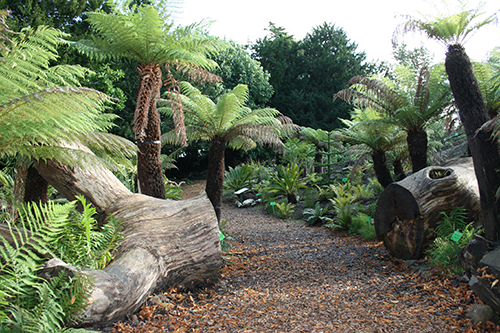The Secretary General of the world's largest plant conservation network, with over 600 members, that links botanic gardens around the world in a shared commitment to save threatened plant species and raise awareness about the importance of plants will give a talk organised by the University of Bristol Botanic Garden next week [Monday 7 October].
Dr Paul Smith, Secretary General of Botanic Gardens Conservation International (BGCI), will give the Annals of Botany Lecture 2019 on Monday 7 October at 7.30 pm.
BGCI's mission is 'to mobilize botanic gardens and engage partners in securing plant diversity for the well-being of people and the planet.'
Dr Paul Smith said: "Sharing precious knowledge of the medicinal uses of plants, recovering rare Camellias in China, global assessment of orchid collections, conserving Pepper-Bark trees in Zimbabwe and Georgian almonds are just a few of the global projects being carried out by BGCI. My talk will illustrate some of the inspirational people involved in the work of botanic gardens worldwide."
Dr Smith has been Secretary General of BGCI since March 2015. He is the former Head of Kew's Millennium Seed Bank (MSB) and, during his nine years at the helm, seeds from more than 25,000 plant species were conserved in the MSB.
He has travelled widely, helping to set up botanic gardens and bring people together with a shared interest to do positive work in their environment and local community.
The role of botanic gardens as a positive force to mitigate against climate change and biodiversity loss organised by the Botanic Garden will take place on Monday 7 October 2019 at 7.30 pm in the Frank Theatre, University of Bristol, Wills Physics Laboratory, Tyndall Avenue, Bristol BS8 1TL.
Admission is £5 for non-members, free to Friends, students and University staff. Further information is available from the Botanic Garden, tel 0117 331 4906 or email botanic-gardens@bristol.ac.uk
Further information
About the Annals of Botany Lecture
Annals of Botany is an international plant science journal that publishes novel and substantial research papers in all areas of plant science, along with reviews and shorter Botanical Briefings about topical issues. It is one of the oldest international journals of botanical science and is hosting the 2019 Annals of Botany Lecture in association with the University of Bristol Botanic Garden.
Previous speakers include: Professor Mark Chase, Head of the Jodrell Laboratory, Royal Botanic Gardens Kew who spoke on 'plant classification past and present'; Roy Lancaster OBE who talked about his travels in China and Simon Pugh-Jones, MBE, Director of the Writhlington School Orchid Projector spoke on the development of the orchid project and its new overseas projects.
About the University of Bristol Botanic Garden
The Botanic Garden has a strong evolutionary theme and cultivates over 5,000 plant species forming four core collections that illustrate plant evolution, plants from Mediterranean climates, useful plants (including Chinese and Western herb gardens) and rare and threatened native plants to the Bristol area.
Star attractions include an amazing dell demonstrating the evolution of land plants including the dinosaurs' favourite plants: ginkgos, cycads, tree ferns, monkey puzzles and the Wollemi Pine. Other delights include glasshouses, home to giant Amazon water lilies, tropical fruit and medicinal plants, orchids, cacti and a unique sacred lotus collection.
Normal admission and opening times
The Botanic Garden is open from 10 am until 4.30 pm or dusk in the winter (except during weekends in February and March when opening times change to 10.30 am until 3 pm).
The Garden is open Monday to Friday and closed at weekends from December until the end of January.
From February until the end of November the Garden is open for seven days a week including bank holidays.
Admission is £6.60 (Gift Aid payment)* or £6 (non - Gift Aid payment); free to University staff and retired staff, Friends of the Botanic Garden, students and children under 18.
*The adult gate entry fee of £6.60 includes a 60p voluntary donation which UK taxpayers can pay, allowing the Botanic Garden to benefit from a 25 per cent refund of tax from the government on each adult ticket.
Dogs (except registered disability assistance dogs) are not permitted in the Botanic Garden.
The garden is accessible for wheelchairs and mobility scooters with a designated path leading around the garden and glasshouses. Disabled toilet facilities are available on site and a wheelchair is available upon request from the Welcome Lodge.
Pre-booked guided tours of the garden for groups of ten upwards are available seven days a week. Please contact the garden for further information. There is a charge for the guide of £8 per person.
Directions to the Botanic Garden
From the city centre go to the top of Whiteladies Road, at the junction and traffic lights go straight ahead across Durdham Down towards Stoke Bishop. At the traffic lights go straight ahead and take the first turning on the right into Stoke Park Road, the Botanic Garden at the Holmes is 150 metres on the right.
Members of the public wishing to support the work of the Botanic Garden should join the Friends of the Garden. For more information go to the Friends of the Botanic Garden or contact Sue Beech, The Membership Secretary, email: membership@fubbg.co.uk

